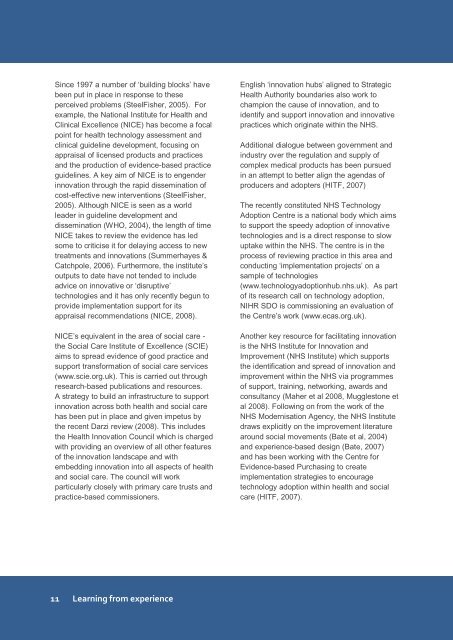Promoting and Embedding Innovation
Promoting and Embedding Innovation
Promoting and Embedding Innovation
Create successful ePaper yourself
Turn your PDF publications into a flip-book with our unique Google optimized e-Paper software.
Since 1997 a number of „building blocks‟ have<br />
been put in place in response to these<br />
perceived problems (SteelFisher, 2005). For<br />
example, the National Institute for Health <strong>and</strong><br />
Clinical Excellence (NICE) has become a focal<br />
point for health technology assessment <strong>and</strong><br />
clinical guideline development, focusing on<br />
appraisal of licensed products <strong>and</strong> practices<br />
<strong>and</strong> the production of evidence-based practice<br />
guidelines. A key aim of NICE is to engender<br />
innovation through the rapid dissemination of<br />
cost-effective new interventions (SteelFisher,<br />
2005). Although NICE is seen as a world<br />
leader in guideline development <strong>and</strong><br />
dissemination (WHO, 2004), the length of time<br />
NICE takes to review the evidence has led<br />
some to criticise it for delaying access to new<br />
treatments <strong>and</strong> innovations (Summerhayes &<br />
Catchpole, 2006). Furthermore, the institute‟s<br />
outputs to date have not tended to include<br />
advice on innovative or „disruptive‟<br />
technologies <strong>and</strong> it has only recently begun to<br />
provide implementation support for its<br />
appraisal recommendations (NICE, 2008).<br />
NICE‟s equivalent in the area of social care -<br />
the Social Care Institute of Excellence (SCIE)<br />
aims to spread evidence of good practice <strong>and</strong><br />
support transformation of social care services<br />
(www.scie.org.uk). This is carried out through<br />
research-based publications <strong>and</strong> resources.<br />
A strategy to build an infrastructure to support<br />
innovation across both health <strong>and</strong> social care<br />
has been put in place <strong>and</strong> given impetus by<br />
the recent Darzi review (2008). This includes<br />
the Health <strong>Innovation</strong> Council which is charged<br />
with providing an overview of all other features<br />
of the innovation l<strong>and</strong>scape <strong>and</strong> with<br />
embedding innovation into all aspects of health<br />
<strong>and</strong> social care. The council will work<br />
particularly closely with primary care trusts <strong>and</strong><br />
practice-based commissioners.<br />
English „innovation hubs‟ aligned to Strategic<br />
Health Authority boundaries also work to<br />
champion the cause of innovation, <strong>and</strong> to<br />
identify <strong>and</strong> support innovation <strong>and</strong> innovative<br />
practices which originate within the NHS.<br />
Additional dialogue between government <strong>and</strong><br />
industry over the regulation <strong>and</strong> supply of<br />
complex medical products has been pursued<br />
in an attempt to better align the agendas of<br />
producers <strong>and</strong> adopters (HITF, 2007)<br />
The recently constituted NHS Technology<br />
Adoption Centre is a national body which aims<br />
to support the speedy adoption of innovative<br />
technologies <strong>and</strong> is a direct response to slow<br />
uptake within the NHS. The centre is in the<br />
process of reviewing practice in this area <strong>and</strong><br />
conducting „implementation projects‟ on a<br />
sample of technologies<br />
(www.technologyadoptionhub.nhs.uk). As part<br />
of its research call on technology adoption,<br />
NIHR SDO is commissioning an evaluation of<br />
the Centre‟s work (www.ecas.org.uk).<br />
Another key resource for facilitating innovation<br />
is the NHS Institute for <strong>Innovation</strong> <strong>and</strong><br />
Improvement (NHS Institute) which supports<br />
the identification <strong>and</strong> spread of innovation <strong>and</strong><br />
improvement within the NHS via programmes<br />
of support, training, networking, awards <strong>and</strong><br />
consultancy (Maher et al 2008, Mugglestone et<br />
al 2008). Following on from the work of the<br />
NHS Modernisation Agency, the NHS Institute<br />
draws explicitly on the improvement literature<br />
around social movements (Bate et al, 2004)<br />
<strong>and</strong> experience-based design (Bate, 2007)<br />
<strong>and</strong> has been working with the Centre for<br />
Evidence-based Purchasing to create<br />
implementation strategies to encourage<br />
technology adoption within health <strong>and</strong> social<br />
care (HITF, 2007).<br />
11 Learning from experience
















